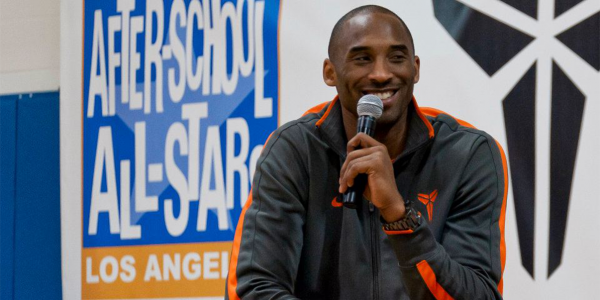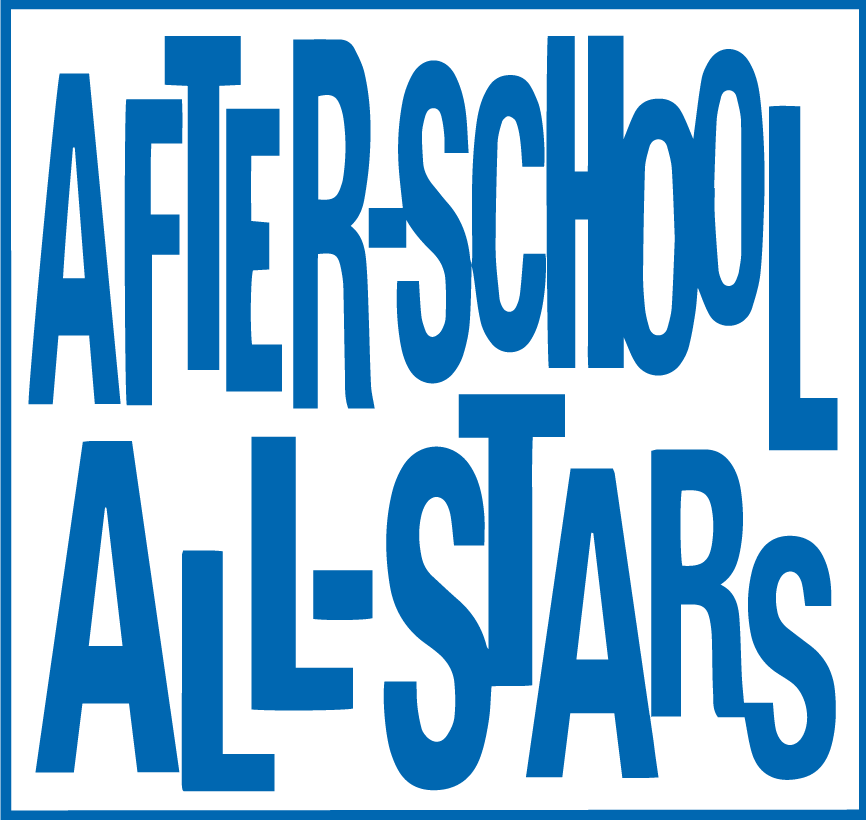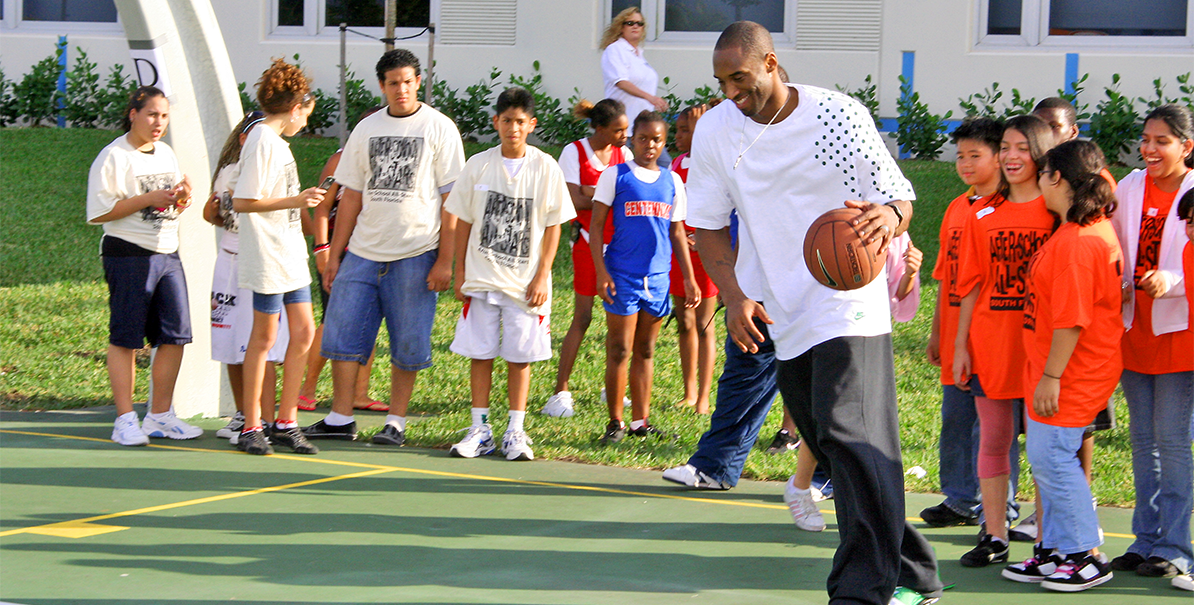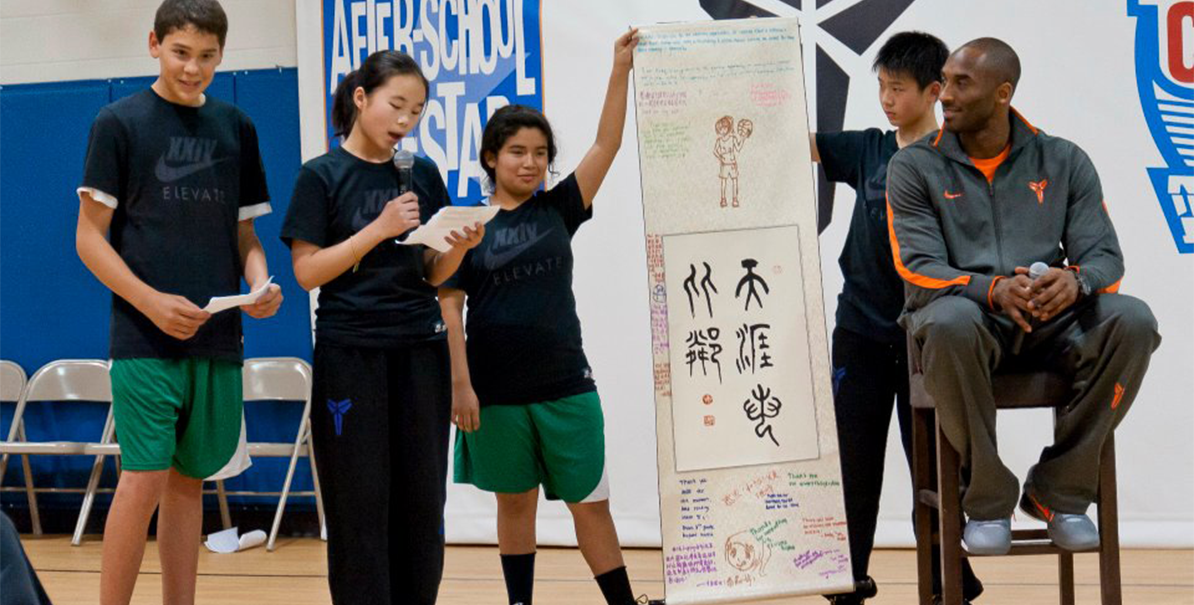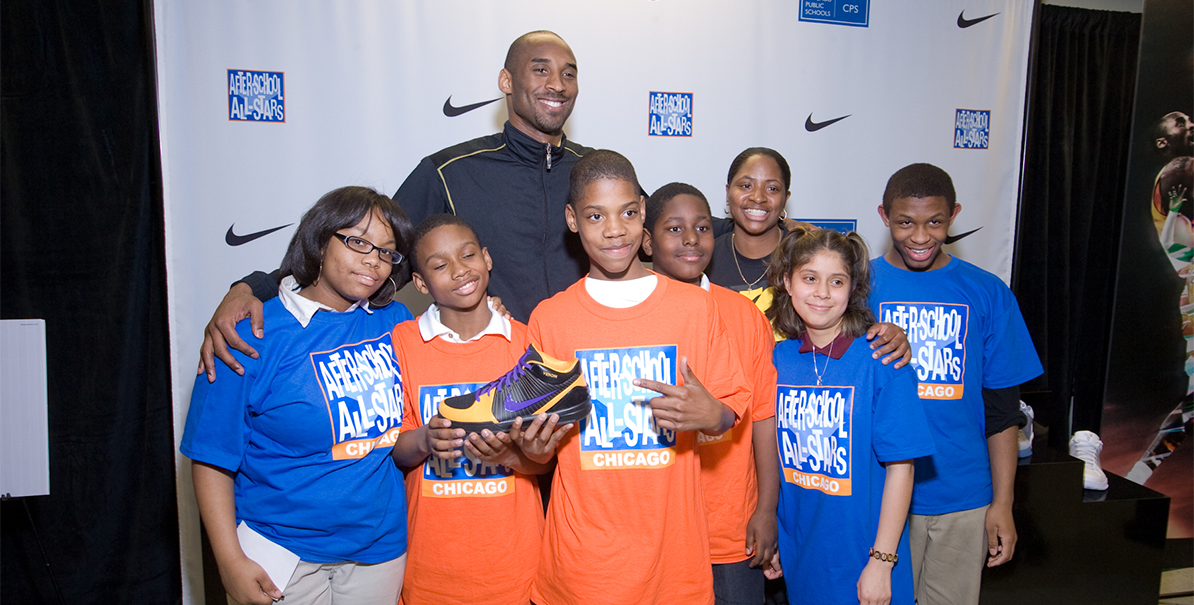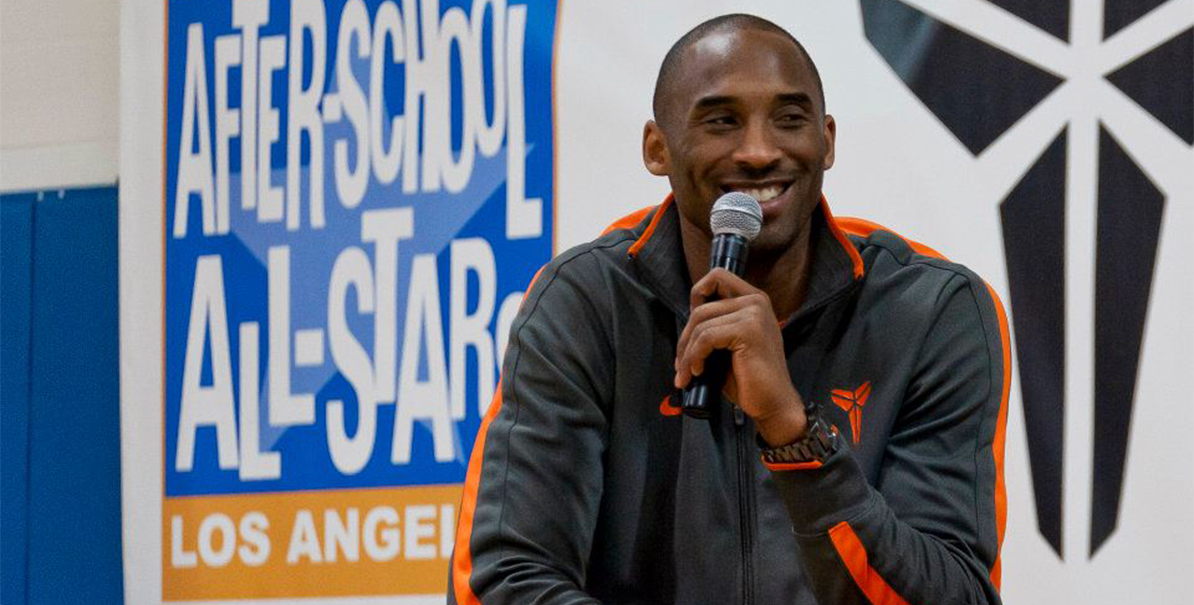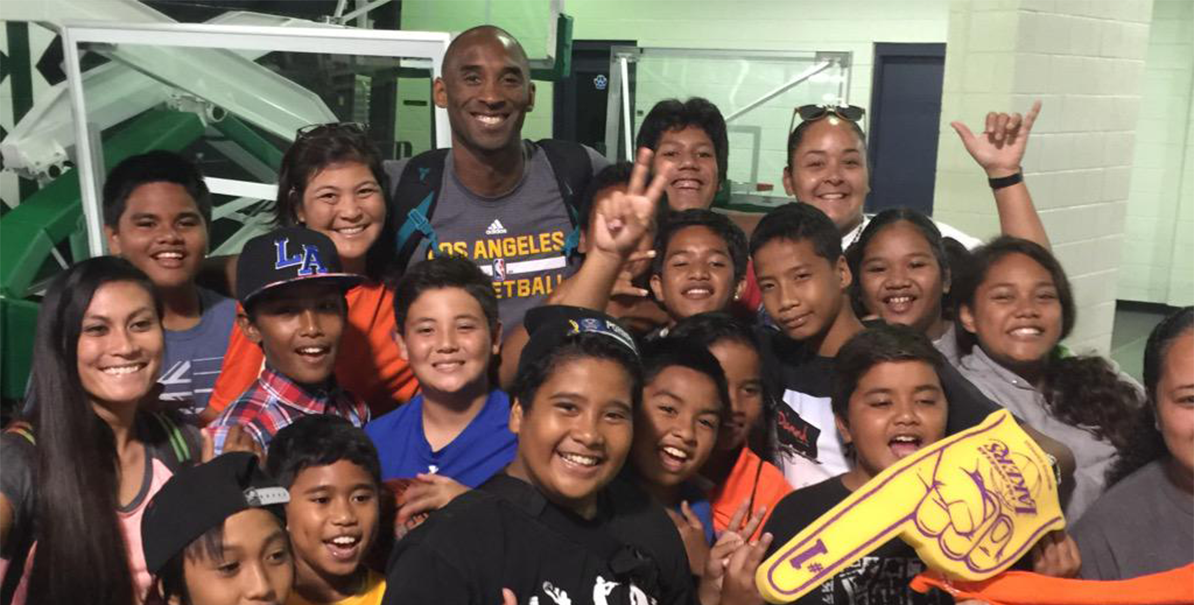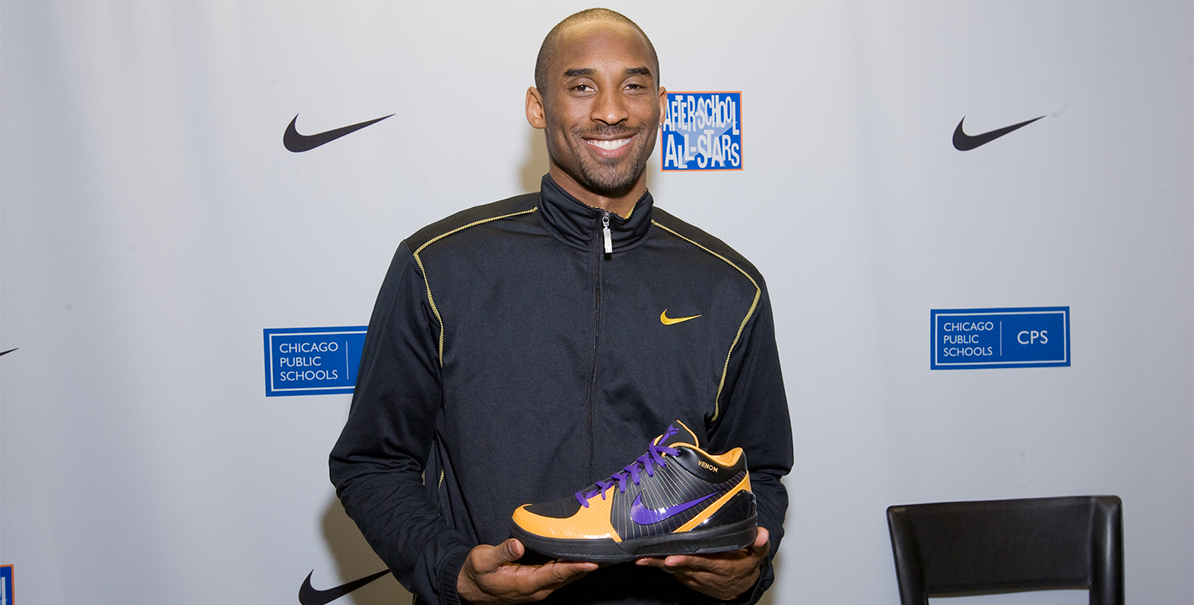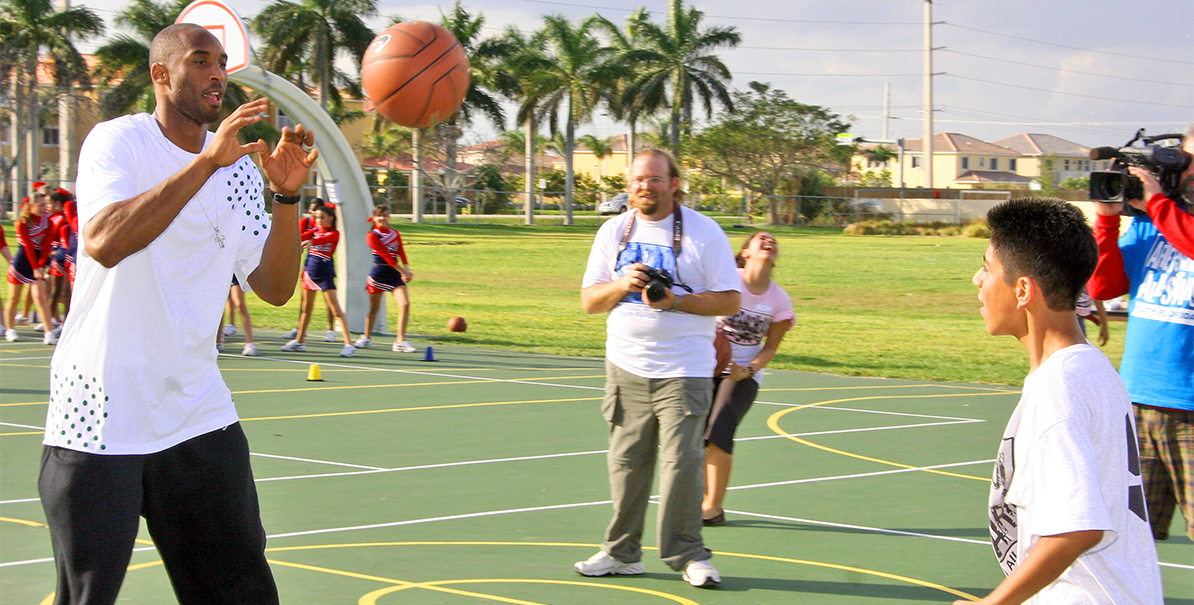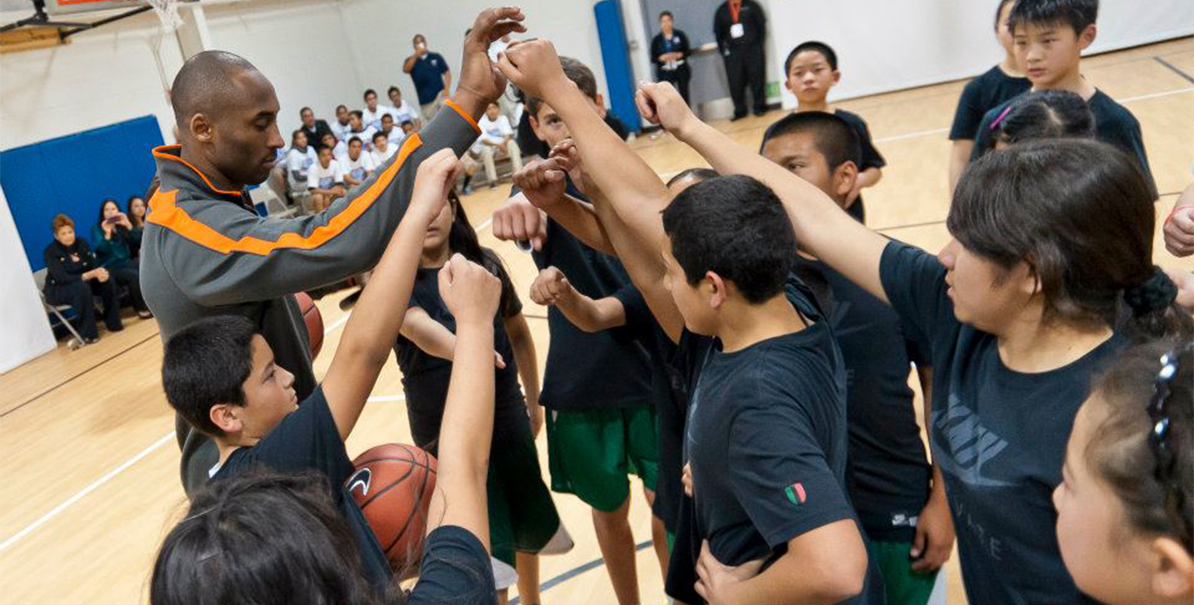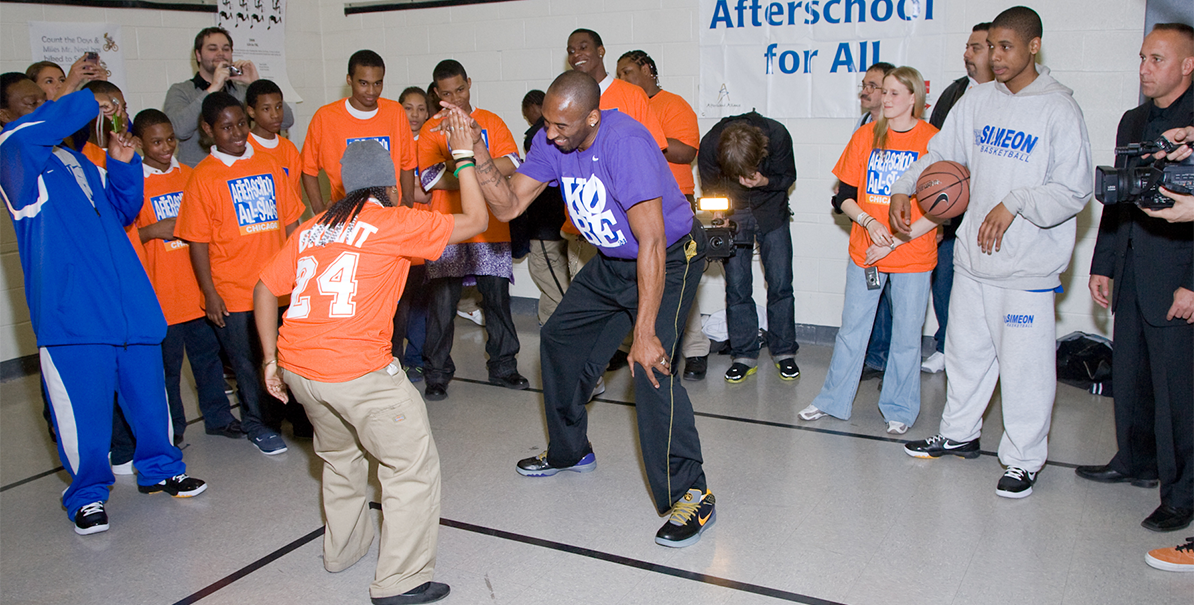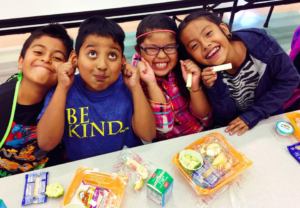Kobe Bryant’s impact on after-school all-stars
By Matthew Kredell
As the world remembers Kobe Bryant the basketball great, ferocious competitor and global icon, there’s another side of Kobe characterized by his efforts to engage with children and inspire them to put the same passion he did into whatever they pursue in life.
Staff and former students of After-School All-Stars recall the impact Kobe made in more than a decade serving as National Ambassador for the organization, one of the country’s largest providers of free after-school services for students in under-resourced communities.
The legacy left by Kobe Bryant, who died on Sunday, January 26th, 2020, along with his 13-year-old daughter Gianna and seven others in a helicopter crash on the way to a youth basketball tournament at Mamba Sports Academy, is more than five NBA championships and two Olympic gold medals in a soon-to-be Hall of Fame basketball career with the Los Angeles Lakers.
After-School All-Stars representatives will never forget Kobe’s smile, generosity, and unique emotional availability, which enabled him to forge meaningful connections with students.
“Kobe was as much a superstar off the court as he was on it,” said Ben Paul, President and CEO of After-School All-Stars. “For over 12 years, he donated his time, wisdom and resources to the 90,000 All-Star students across the country. What I will remember most about Kobe’s involvement with us as a National Ambassador is how authentically he connected with students when he spent time with them.”
USING HIS SPOTLIGHT TO HELP KIDS
In 2007, Ben Paul met Kobe through a mutual friend and showed him the impact being made by After-School All-Stars, which offers tutoring, academic enrichment, athletic programs and mentoring at 468 elementary, middle and high schools across 60 U.S. cities during the critical hours of 3 to 6 p.m. Monday through Friday.
Kobe immediately committed to supporting the students and programs with the same passion he put into his craft.
In addition to school visits, he gave kids scholarships to summer basketball camps, got them tickets to Lakers games, took part in fundraisers, and even sent a group of kids from the Los Angeles chapter to China through a cultural exchange program to gain the international perspective that shaped him growing up.
“One wrong decision in middle school can really impact a life in a negative way, or one good decision can send it down the right path,” Paul said. “Every now and then we meet people who really, truly get it, and Kobe Bryant was one of them.”
Actor and former California Governor Arnold Schwarzenegger, who founded After-School All-Stars in 1992, thanked Kobe for the example he set for athletes.
“Celebrities and athletes have the opportunity to perform on a huge stage and reach millions of people,” Schwarzenegger said. “That comes with a responsibility to recognize that we aren’t self-made. Whether we are actors or athletes, we got to where we are with a lot of help, and it’s our job to pass that on to the next generation.
“As one of the greatest basketball players of all time, Kobe’s spotlight was brighter than almost anyone’s, and he used it to help millions of kids. For 12 years he was an ambassador for After-School All-Stars, and he used his time and his resources to inspire our 90,000 kids and help build opportunities for them. It wasn’t a celebrity endorsement where he slapped his name on it and walked away. He was hands on, spending time with students and bringing them to his basketball camps and on and on. I couldn’t be more grateful to him for his work on behalf of our students.”
BEYOND LOS ANGELES
Kobe didn’t just visit after-school programs in his hometown of Los Angeles. Whenever he saw an opportunity for afternoon downtime on the road in a city served by After-School All-Stars, he set aside fatigue from the grueling NBA schedule to visit schools.
Paul remembers the time Kobe visited a school in Harlem. The moment he arrived, the school erupted with excitement, claps and cheers. As hundreds of kids filled the school gym, Kobe began connecting with them through basketball drills.
Word quickly spread that one of the world’s biggest stars was in town and, despite security doing what they could, 20 minutes after his arrival there were in excess of a thousand people crowding inside the gym.
Seeing the situation getting beyond his control, Paul suggested that Kobe wrap up the session early. But he kept going, setting up an imaginary scenario that it was Game 7 of the NBA Finals, the clock was winding down and it was up to the kids to steal the ball from him. As he was leaving, Kobe even yelled out for a group photo and a sea of kids engulfed him.
“It really brought together everything about Kobe and the organization and why he was a good fit as an ambassador, because the kids loved him and he loved them,” Paul said. “Having worked with a lot of various athletes and celebrities, he stood out from anyone else I’ve ever met. He would light up around kids. Put most adults in a room full of 12-year-olds and it’s the most terrifying environment you could put them in, but that was where Kobe wanted to be. That was his element.”
IN HIS OWN WORDS
In his own words, Kobe described what After-School All-Stars meant to him in 2009:
“This program gives kids an opportunity to be able to expand their horizons and to be able to dream. I think it’s important for our youth to feel supported, to feel like there’s an environment where people care about them, people who will help them and guide them to doing the right thing and pursuing their dream.
“As you get older, you see how many people you can affect and how many lives you can touch and the difference you can make, and it really puts things into perspective. I used to hear it all the time when I was a kid – that you have to stay focused; education is the key – but as a kid it never really sinks in unless you’re put in an environment where all that comes to fruition. So it has to not only be said but it has to be lived, and in this program and this environment it’s lived on a daily basis. That’s why I think this program is so special.”
A DIFFERENT KIND OF CELEBRITY
Sean Prospect, executive director of the South Florida chapter of After-School All-Stars, was amazed when Kobe visited in 2008 and took the time to engage individually with each of the 120 students.
“We’ve had different celebrities come through, and usually they talk to the kids as a group, take a couple pictures and leave,” Prospect said. “To my pleasant surprise, when Kobe came he spent hours upon hours interacting with every single kid. He approached that camp the way he approached basketball and everything else. He always held himself to a higher standard.”
Years later, at a Miami Heat game, Prospect saw Kobe when he came to town and thanked him for what he did for the children. He recalls Kobe responding that it was his pleasure, as his passion was helping and guiding youth.
HIS IMPACT AROUND THE WORLD
In 2011, Kobe came to After-School All-Stars and proposed a cultural exchange in which Nike and the Kobe Bryant Family Foundation would bring 10 All-Stars to China for two weeks over the summer and ASAS would host 10 students from China.
Having spent some of his formative years in Italy, he wanted the students, many of whom had never before left the state of California, to gain the perspective he did from experiencing another culture and country. The program ran for four years.
Marlen Quintero Perez was a 16-year-old student at Huntington Park College-Ready Academy High when she took part in the 2011 China exchange program.
“To be received in China was a life-changing moment to move out of our spectrum of just being in LA and in our own community, and it was all thanks to Kobe,” Perez said. “He wanted to bridge communities together. I had only ever been to Mexico, with the same people from my community. To go to China and experience a different culture, different food, different people, sparked an interest in me to then continue getting an education.”
Over the course of the trip, the students attended a basketball game with Kobe and a press conference where they had the opportunity to ask him questions, get pictures and autographs. Perez remembers feeling nervous to ask for a photo with him signing her Kobe jersey, but he put her at ease by responding “Fo’ sho, fo’ sho.”
“From seeing him on TV, I thought he’s intense and probably not too talkative, but that day he was completely different,” she said. “It was a very personal experience.”
Now a PhD student at UCLA in the Graduate School of Education, Perez still has the Nike Zoom Kobe VI sneakers she received to wear to China, where she got them autographed. She framed the signed jersey and gave it to her older brother.
Recently, teaching her first class as a part-time lecturer at California State University, Northridge, she asked students to introduce themselves and provide a fun fact. She started, and her fun fact was that she met Kobe three times.
A LASTING IMPACT
In addition to the impact he made directly on children in After-School All-Stars, Kobe connected with the organization’s mission and used his platform to raise awareness for the importance of free, comprehensive after-school programs. In television appearances on Entertainment Tonight, ESPN and late-night talk shows, he spoke about the work of After-School All-Stars and emphasized the need for continued federal funding.
“There’s only so much a school day can do to help kids,” Paul said. “We have kids an extra three hours, and if a typical school day is six hours that’s 50% more time. After-school programs are a big part of the holistic education of students, and Kobe got that.”
Kobe’s work with After-School All-Stars foretold how he would go on to dedicate his time fully to producing inspiring stories for youth after retiring from the NBA, in his Oscar-winning short film Dear Basketball, books and other media.
“Losing Kobe and Gianna was heartbreaking,” Schwarzenegger said. “I can’t stop thinking of his family and all of his fans and the millions – even billions – of kids he inspired.”
WATCH KOBE AS AN AMBASSADOR FOR AFTER-SCHOOL ALL-STARS
